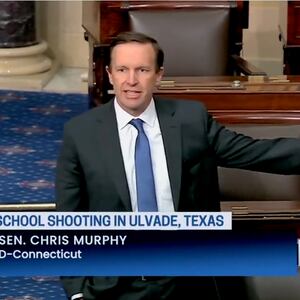Hours after the deadliest mass shooting at an elementary school in nearly a decade, President Joe Biden gave the speech that he’d prayed he would never have to give.
“I’d hoped, when I became president, that I would not have to do this again. Another massacre…” Biden said, pausing to compose himself. “Another elementary school.”
In a primetime address from the Roosevelt Room of the White House, Biden appeared visibly shaken by the murder of at least 19 students and two adults at Robb Elementary School in Uvalde, Texas on Tuesday, according to the Texas Department of Public Safety, only ten days after another gunman’s attack on a grocery store in Buffalo. Biden, whose political career has been marked by moments of deep parental grief, began his remarks with an exhausted sigh, a sigh that punctuated his remarks multiple times as he described “the hollowness in your chest” at the loss of a child.
“It's like having a piece of your soul ripped away,” Biden said, nearly overcome with emotion. “It’s never quite the same. It’s a feeling shared by the siblings and the grandparents and family members and the community that’s left behind.”
Biden angrily noted that the few known facts of the Uvalde massacre—a teenage shooter who targeted young children at a nearby elementary school—evoke memories of the infamous mass shooting in Newtown, Connecticut, that left 20 six- and seven-year-old children dead almost ten years ago.
“Since then, there have been over 900 incidents of gunfire reported on school grounds,” Biden said. “Marjory Stoneman Douglas High School in Parkland, Florida. Santa Fe High School in Texas. Oxford High School in Michigan. The list goes on and on, and the list grows.”
“Why are we willing to live with this carnage? Why do we keep letting this happen?” Biden angrily added later in his remarks. “Where in God’s name is our backbone?”
Biden, who was first briefed on the shooting midair while returning from a trip through East Asia, issued a presidential proclamation calling for the nation’s flags to be flown at half-mast for the next four days “as a mark of respect for the victims of the senseless acts of violence.”
But before Air Force One had even touched down, many of the president’s fellow Democrats, incensed by a decade of near-total inaction on the part of the federal government in the wake of Newtown, demanded that national leaders—up to the White House—do more.
“What are we doing?” Sen. Chris Murphy (D-CT) asked in a speech from the Senate floor on Tuesday. Murphy, a senator-elect the time of the Newtown massacre in his home state, has become the body’s conscience on gun violence in the years since. “What are we doing? Why do you spend all this time running for the United States Senate, why do you go through all the hassle of getting this job, of putting yourself into a position of authority, if your answer as this slaughter increases, as our kids run for their lives, we do nothing? What are we doing? Why are you here, if not to solve a problem as existential as this?”
Perhaps more than any of his predecessors, Biden knows how impossibly narrow the path to meaningful legislative gun-control legislation can be. In 2012, days after the Newtown massacre, he was tasked by President Barack Obama with steering the most ambitious gun-control legislation in decades through the Senate. Biden’s efforts failed, however, and despite promises during his presidential campaign of closing the “gun-show loophole” and instituting a national gun buyback program, no such legislation has ever made it to Biden’s desk.
In his remarks, Biden called on legislators to finally “stand up to the gun lobby,” which has thwarted his own efforts to enact permanent gun-reform since his time in the U.S. Senate.
“I am sick and tired,” Biden said angrily. “We can have an impact on this carnage. I spent my career as a senator and a vice president working to pass commonsense gun laws. We can’t prevent every tragedy, but we know they work.”
There are a smattering of gun-related bills that would accomplish much of Biden’s agenda on firearms. The Bipartisan Background Checks Act passed the House of Representatives in March, and the Untraceable Firearms Act, introduced earlier this month by Sen. Richard Blumenthal (D-CT), another staunch advocate of measures intended to prevent the next Newtown, would make proposed rule changes by the Department of Justice Department on “ghost guns” permanent.
But with Republicans almost entirely blocking those efforts, as well as hoping to keep Biden’s latest nominee to lead the Bureau of Alcohol, Tobacco, Firearms and Explosives from being confirmed, those efforts will almost certainly remain mired in congressional quicksand.
That reality has left Biden with little more than executive orders and proposed regulatory changes at his immediate disposal—and, yet again, removing responsibility from congressional Republicans who have opposed even the most popular gun safety measures and redistributing it onto the shoulders of those who have tried and, so far, failed to help.
“God bless the loss of innocent life on this sad day,” Biden said at the conclusion of his remarks. “May the Lord be near the brokenhearted and save those crushed in spirit, because they’re going to need a lot of help.”








